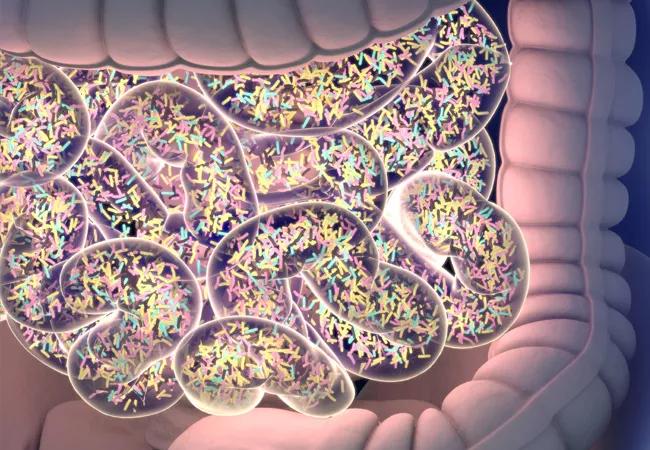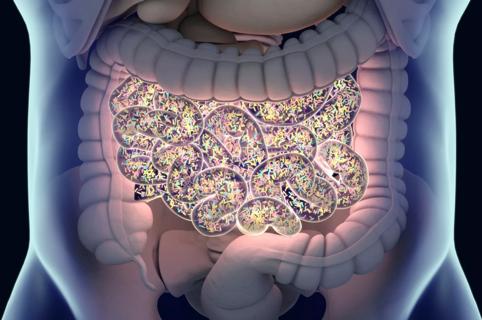TMAO pathway impacts infarct size and functional impairment in preclinical stroke models

New preclinical findings from Cleveland Clinic researchers show for the first time that the gut microbiome impacts stroke severity and functional impairment following stroke. The results, published in Cell Host & Microbe, lay the groundwork for potential new interventions to help treat or prevent stroke.
Cleveland Clinic is a non-profit academic medical center. Advertising on our site helps support our mission. We do not endorse non-Cleveland Clinic products or services. Policy
The research was led by Weifei Zhu, PhD, and Stanley Hazen, MD, PhD, researchers in Cleveland Clinic’s Department of Cardiovascular & Metabolic Sciences. The study builds on more than a decade of research spearheaded by Dr. Hazen related to the gut microbiome’s role in cardiovascular health and disease. Much of that work has focused on the adverse effects of TMAO (trimethylamine N-oxide), a metabolite produced when gut bacteria digest certain nutrients abundant in red meat and other animal products, including choline, lecithin and carnitine.
“The present study expands on our earlier findings and for the first time provides proof that gut microbes in general — and through TMAO specifically — can directly impact stroke severity or post-stroke functional impairment,” says Dr. Hazen, who serves as Co-Section Head of Preventive Cardiology and Rehabilitation at Cleveland Clinic and directs its Center for Microbiome & Human Health.
Previously, Dr. Hazen and his team discovered that elevated TMAO levels can lead to the development of cardiovascular disease-related events. In clinical studies involving thousands of patients, the team has shown that blood levels of TMAO predict future risk of heart attack, stroke and death — findings that have been replicated around the world. Earlier studies, also led by Drs. Zhu and Hazen, were the first to show a link between TMAO and increased risk for blood clotting (as recapped here and here).
“In the current study we found that dietary choline and TMAO produced greater stroke size and severity as well as poorer outcomes in preclinical models,” notes Dr. Hazen. “Remarkably, simply transplanting gut microbes capable of making TMAO was enough to cause a profound change in stroke severity.”
The researchers transplanted fecal material from human subjects with high and low TMAO levels into germ-free mice. They also performed parallel experiments using defined microbial communities genetically engineered with or without the ability to make the precursor of TMAO.
Over time, the recipients of the microbes from subjects with elevated TMAO levels (or synthetic communities that can make the TMAO precursor) were found to have significantly more TMAO in their blood. Higher blood TMAO levels were associated with more extensive brain damage in multiple stroke models and a greater degree of motor and cognitive functional deficits following stroke. Furthermore, dietary manipulations to alter TMAO levels were found to impact stroke severity, as higher blood levels of TMAO were associated with larger cerebral infarct size.
“Functionality after a stroke is a major concern for patients,” says Dr. Hazen. “To understand whether dietary choline and TMAO modulate post-stroke functionality, in addition to stroke severity, we compared performance on various tasks before stroke and in the short and long term following stroke in our preclinical model.”
The team found that transplanting microbes that harbor an enzyme critical to dietary choline-related TMAO production in the gut, called CutC, was sufficient to drive heightened stroke severity (i.e., a more than twofold increase in cerebral infarct size) and worsened outcomes (i.e., a 20%-30% reduction in multiple functional outcome measures).
According to co-investigator Dr. Zhu, targeting this gut microbe enzyme may be a promising approach to prevent diet-associated stroke. “When we genetically silenced the gut microbe gene that encodes CutC, stroke severity significantly diminished,” she explains. “Ongoing research is exploring this treatment approach, as well as the potential for dietary interventions to help reduce TMAO levels and stroke risk, since both a Western diet and a diet rich in red meat are known to elevate TMAO levels.”
The team’s next goal will be to test whether inhibiting the microbial step involved in TMAO production provides therapeutic benefits in preclinical models.
Disclosure: Dr. Hazen reports being named as co-inventor on pending and issued patents held by Cleveland Clinic relating to cardiovascular diagnostics and therapeutics, as well as having received royalty payments for inventions or discoveries related to cardiovascular diagnostics or therapeutics from Cleveland Heart Lab (a fully owned subsidiary of Quest Diagnostics), Procter & Gamble, and Zehna Therapeutics.

Large-scale joint study links elevated TMAO blood levels and chronic kidney disease risk over time

Investigators are developing a deep learning model to predict health outcomes in ICUs.

International collaboration is most genetically diverse study of the disease to date

Preclinical work promises large-scale data with minimal bias to inform development of clinical tests

Cleveland Clinic researchers pursue answers on basic science and clinical fronts

Study suggests sex-specific pathways show potential for sex-specific therapeutic approaches

Cleveland Clinic launches Quantum Innovation Catalyzer Program to help start-up companies access advanced research technology

Research project aims to pinpoint biomarkers that could speed diagnosis